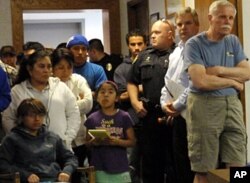A tough immigration enforcement law scheduled to take effect in Arizona at the end of July is touching off debate and controversy far beyond the southwestern state. As a consequence, immigration reform is moving higher on the list of issues Americans say they want their politicians to address.
The Arizona law requires immigrants to carry their registration documents at all times. It also directs local police to question people they suspect are in the country illegally… a job usually done by federal law enforcement.
A Washington Post/ABC News poll found a majority of Americans – 58 percent – support the controversial course of action Arizona is taking. And roughly half the respondents in another national poll said they want their state to copy its get tough approach.
A proposal for a tougher stand
Woodland, Washington is a surprisingly diverse American small town. Third generation berry farmers live near people who commute to work in distant Portland, Oregon, who in turn live near under-employed construction and mill workers. Woodland also has a growing Hispanic population.
The mix verged on combustible at an overflowing City Council meeting recently, as townspeople commented on a resolution to endorse Arizona's immigration crackdown and to urge the Washington State Legislature to follow suit.
One woman told council members, "The law opens the door to the indiscriminate use of racial profiling against individuals that look or sound foreign."
"If you came to this country illegally, you started off on the wrong foot," another resident said. "You need to go back home, do the paperwork and come back the right way."
A woman took the microphone to complain, "A lot of these people who are coming in illegally, they're getting medical coupons. They're getting food stamps... They're getting all kinds of things that are provided through our tax system. It has to stop! It has to stop somewhere!"
A Woodland retiree agreed illegal immigration is out of hand, but said local Hispanic families are good people. "We're not a border town," she said. "That's the way I feel. Number one, we're not a border town. That's not our business."
Putting a stop to illegal immigration from the bottom up
But City council member Benjamin Fredericks says it is Woodland's business. He introduced the controversial resolution, pointing out, "It obviously isn't working from the top down. The federal government is ignoring current law. That's why I believe Arizona has the right to pass their own laws." He sees Arizona's action and his proposal as part of an effort to start reform from the bottom up, and said he'd like to see the Washington state legislature take up the issue.
Juan Barela is a counselor and human rights activist in Woodland. He says Arizona's immigration controversy has awakened the nation's Latino communities. "Now we are galvanized, united. We are strong and we're getting the vote."
In the end, the Woodland city council voted down the resolution that would have urged the legislature to copy Arizona's tough enforcement approach.
City councils in Seattle, Washington, and Los Angeles, California, have passed boycotts of Arizona travel and business contracts to show their disapproval of the new law. Most recently, the debate surfaced in Fremont, Nebraska where voters approved a city law against hiring or renting to illegal immigrants.
Public unease about immigration
Portland, Oregon-based opinion pollster Adam Davis says all of the controversy is moving immigration higher on the list of issues people want addressed. "When you ask about the biggest problem facing the nation," he notes, "just recently there has been a real surge in the number of people that mention immigration. In the West particularly, it jumped from 2 to 16 percent in the Western states, saying that it the biggest problem facing the nation."
Davis theorizes the support for stronger immigration enforcement reflects tough times. "They feel these people are taking jobs away from legal residents. In tough economic times, this is something that really concerns a lot of people. And it is not just jobs. There is also a feeling that resources are limited, that there isn't the money out there to provide government services to these people."
Craig Keller hopes to tap that public unease. Keller directs a citizen initiative campaign in Washington State. His proposal would require all employers to check the immigration status of new hires through the government's e-verify service. Recipients of public benefits would also have to be validated.
"It's very ironic that there is huge public demand for a law like this. But the 'representatives'," he says with a bit of a sneer, "that have been selected to go to Olympia are not representing the people. That's why this is a perfect example of why the citizens' initiative process is required." His campaign needs to gather a quarter-million voter signatures to qualify the measure for the November ballot.
Meanwhile, the Obama administration and some Arizona city governments hope to convince a judge to stop Arizona's new immigration law from taking effect later this month.










